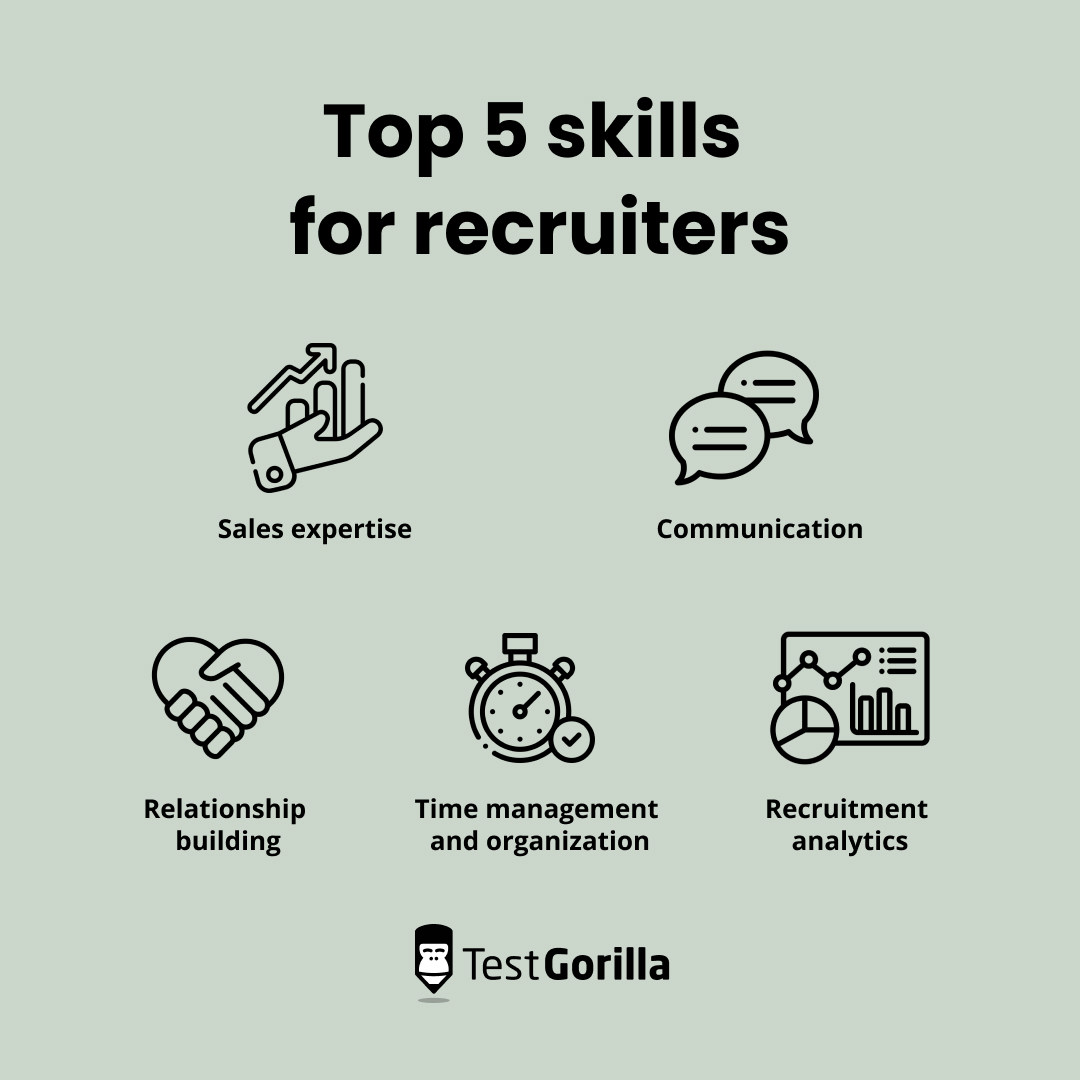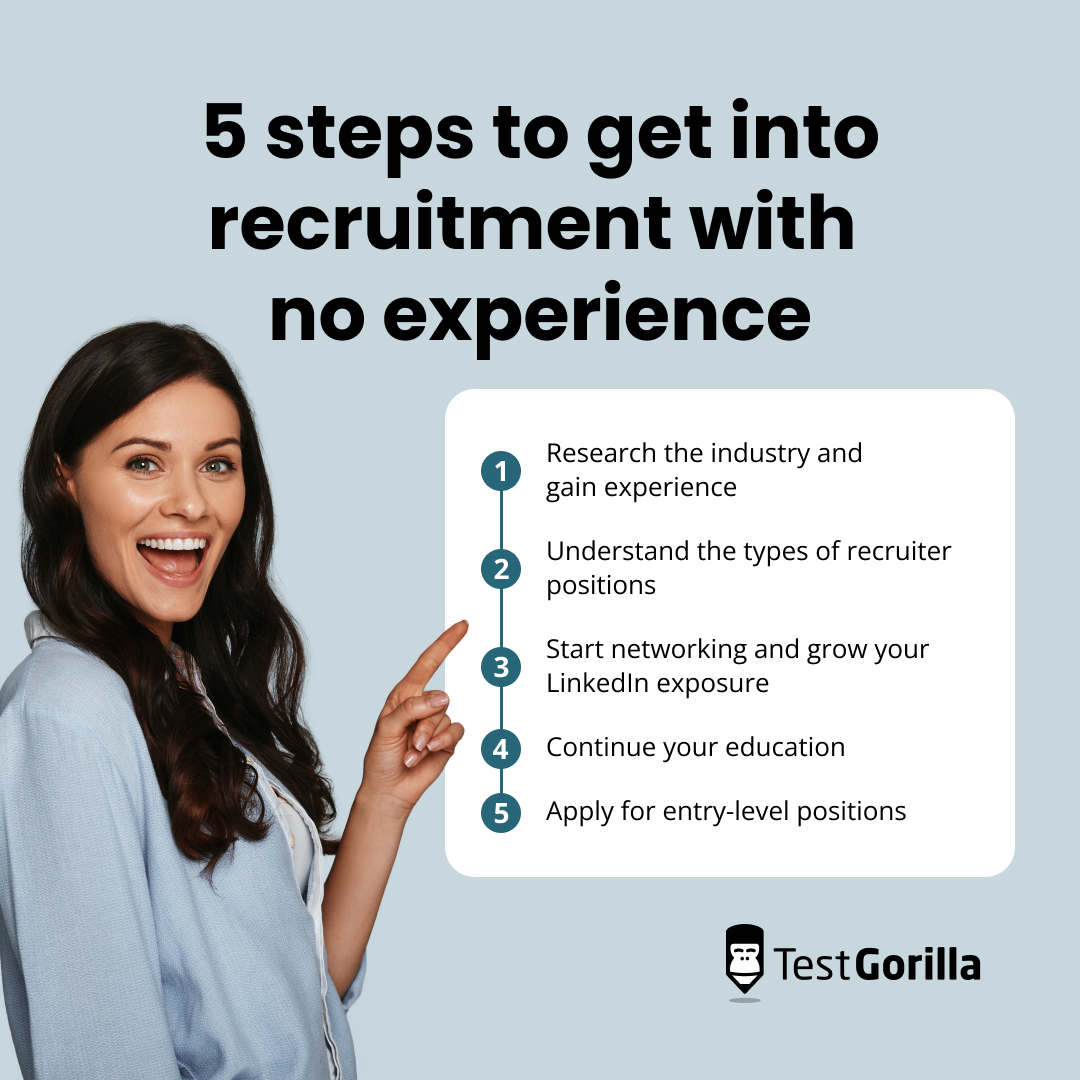The art of recruitment stands as an invaluable skill for companies competing for top talent. However, if you want to embark on a career in recruitment it can be hard to know where to start, especially if you think you don’t have the right qualifications.
To become a star recruiter, you’ll need to overcome a lack of experience, build credibility from scratch, and learn how to pick suitable candidates out of the crowd.
This article explores how to do this, and it serves as a comprehensive guide to help you get started. We’ve taken a closer look at what a recruiter does and what skills are required while outlining a clear, step-by-step process to teach you how to get into recruiting.
Table of contents
What does a recruiter do?
A recruiter's main role is to identify and attract suitable candidates to fill open positions within a company. They are integral in the hiring process as they work with hiring managers and teams to understand a position and find potential candidates.
Additionally, recruiters are often responsible for overseeing the hiring process. This includes pre-employment screening, in-person interviews, and in some cases, onboarding.
Some of the other roles of recruiters include:
Candidate relationship management
Contract negotiation
Market research to stay on top of industry trends
Maintaining regulatory compliance
As a recruiter, you’ll experience a lot of interactions with other people, including employers and potential candidates. Because of this, good interpersonal and communication skills are invaluable.
Traditional routes into recruiting
Something that makes it hard for people to enter the world of recruiting is that there’s no single accepted qualification or pathway into recruitment.
In the past, people who wanted to get into recruitment usually completed a human resources degree and obtained various professional certifications. However, this isn’t necessarily the only way into the industry. It’s even possible to land a position without a college degree–although a bachelor’s degree in any field is certainly advantageous.
This is because having the right skills and experience is usually more important than specific qualifications. There are numerous ways to gain these skills, such as through training, internships, and volunteer positions. Let’s delve deeper into what these skills are and how to get them.
The most important skills for recruiters
As a modern recruiter, you’ll need a versatile skill set that enables you to adapt and work with an ever-changing recruitment landscape. Understanding these will help you identify areas where you’re lacking so that you can work on them.
TestGorilla’s Talent Acquisition test is an excellent tool that you can use to gauge your recruitment skills. It’s a short, 10-minute test that covers a range of skills including sourcing, onboarding, and recruitment analytics. While it’s designed to help employers identify skilled candidates, it’s also extremely useful for anyone who wants to learn what it takes to be a recruiter.
Here’s a more detailed breakdown of some of the most important skills for recruiters.
1. Sales expertise
In many ways, a recruiter is a salesperson. They’re trying to sell the perks of a position to candidates, while also trying to sell a candidate’s abilities to the employer.
Because of this, people with a sales background often make excellent recruiters. However, people enter the industry from fields as varied as software development, psychology, and business management. Recommended reading: 10 traits to look for when hiring salespeople (and how to evaluate them)
2. Communication skills
As a recruiter, you’ll need to be able to communicate clearly and persuasively with candidates, employers, and colleagues. Strong written and verbal communication skills are a must too, as these will help you effectively convey job requirements, feedback, and other important information.
What’s more, you need to be empathetic towards the people you’re working with as this will help you to better understand their wants and needs. Communicating empathetically also builds trust, which is crucial for developing strong working relationships with both candidates and employers.
Recommended reading: Your hiring team’s guide to workplace communication tests
3. Relationship building
The ability to create professional connections and identify and attract potential candidates for a position is an invaluable skill for recruiters. It enhances your ability to build a robust talent pool, enabling you to offer better and more efficient matches between candidates and open positions.
Strong relationship-building skills will help you build connections with potential candidates and attract them to apply for positions. You’ll be able to create more meaningful professional relationships, making it easier to identify hidden talent that’s not immediately obvious.
4. Time management and organization
Recruitment roles are usually busy and fast-paced, and you’ll most likely find yourself working with numerous candidates across various job positions at the same time. Because of this, time management and organizational skills are essential.
These will ensure you don’t miss important details and can manage tasks efficiently, streamlining the recruitment process.
5. Recruitment analytics
If you have strong recruitment analytics skills, you’ll be able to gather, analyze, and interpret recruitment-related data. This can be a very powerful tool for informing your decisions and optimizing your recruitment strategies.
Online pre-employment testing platforms like TestGorilla offer a great way to gather data about potential candidates. Spending some time familiarizing yourself with platforms like TestGorilla will help you gain valuable recruitment skills that you can apply when you land your first role.
5 steps to get into recruitment with no experience
Entering the recruitment field is something that people from almost any background can do. Many skills from other professions are transferable to recruitment, and you might find that you’re already quite well-suited to the role.
Here’s a list of five steps to help you break into the industry.
1. Research the industry and gain experience
There’s a vast array of educational resources available online that relate to the recruitment industry. This includes videos, articles, and other online resources. Websites like Indeed and LinkedIn are a great place to start, especially if you want to get into recruitment with no experience. They enable you to learn about everything from recruitment best practices to techniques for identifying top talent.
You can also gain experience through internships and volunteer roles. For example, you could volunteer as an amateur recruiter for a local charity or sporting club to gain relevant experience. Alternatively, try to find an internship that enables you to shadow an experienced recruiter.
2. Understand the types of recruiter positions
Identifying the type of recruitment position you want will help you focus on honing the most important skills and applying for suitable positions. For starters, think about whether you want to become an agency or a corporate recruiter.
Agency recruiters work for specialized recruitment agencies and staffing firms. They source candidates to fill roles for their clients, and they work with multiple clients and industries.
On the other hand, corporate recruiters work for a single company and handle its recruitment needs. This means that they work closely with the company’s hiring team to understand roles and identify and recommend suitable candidates.
Recruitment roles also vary significantly across industries. Some examples include:
Headhunters, who work for agencies and are responsible for finding suitable candidates for a range of positions
Internal recruiters, who work for an organization and look internally for appropriately qualified candidates
Management and executive recruiters, who specialize in finding skilled candidates for high-level roles
Military recruiters, who specialize in recruiting people for the military.
Legal recruiters, who source candidates for legal positions such as attorneys and lawyers.
Think about the type of role you’d like, and plan your training and networking accordingly.
3. Start networking and grow your LinkedIn exposure
Networking by attending industry-related events and workshops can help you meet and learn from other recruitment industry professionals. It’s also a great way to find mentorship opportunities and entry-level positions. Online platforms like LinkedIn are a great place to search for upcoming events near you.
You should also expand your network online through LinkedIn and other professional networking platforms. Make sure that your LinkedIn profile highlights your skills, experience, and ambitions. It’s also a good platform for finding recruitment-related content and connecting with professionals in the field.
4. Continue your education
There’s no such thing as learning too much, and you should strive to learn continuously if you want to build a successful career as a recruiter.
If you haven’t completed a bachelor’s or other higher-level degree, you might like to start there. Not all companies require tertiary education, but studying a related degree like communications or psychology will leave you well-equipped to enter the industry.
You can also attend professional workshops and seminars to grow your knowledge and stay up-to-date with industry best practices. Other great options are attending short courses and completing professional certifications offered by training institutions and industry bodies like the HR Certification Institute (HRCI).
5. Apply for entry-level positions
Once you feel you’re ready to begin applying for jobs, you’ll need to look for entry-level positions that require minimal experience. These roles include recruitment coordination, talent sourcing, recruitment assistance, and other similar positions.
To maximize your chances of getting an interview, ensure you craft a tailored resume and cover letter for each application. Highlight your transferable skills and why you want to enter the recruitment field and emphasize any relevant experience.
Once you’ve got your foot in the door, the sky’s the limit. As you gain experience, you’ll be able to apply for higher-level recruitment positions and build your career.
Using this information to become a recruiter
Although entering the recruitment field might seem difficult, it’s actually a role that people from many different career backgrounds are suited to.
Numerous skills from other positions are quickly transferable, and you can develop the rest while on your new career path.
To be a successful recruiter, you’ll need to have strong communication and interpersonal skills. You’ll also need to learn to source top talent, analyze recruitment data, and more.
If you’d like to gain further insight into the skills needed and what exactly recruitment roles involve, check out our guide to how to be a good recruiter.
Related posts
Hire the best candidates with TestGorilla
Create pre-employment assessments in minutes to screen candidates, save time, and hire the best talent.
Latest posts
The best advice in pre-employment testing, in your inbox.
No spam. Unsubscribe at any time.

Hire the best. No bias. No stress.
Our screening tests identify the best candidates and make your hiring decisions faster, easier, and bias-free.
Free resources
This checklist covers key features you should look for when choosing a skills testing platform
This resource will help you develop an onboarding checklist for new hires.
How to assess your candidates' attention to detail.
Learn how to get human resources certified through HRCI or SHRM.
Learn how you can improve the level of talent at your company.
Learn how CapitalT reduced hiring bias with online skills assessments.
Learn how to make the resume process more efficient and more effective.
Improve your hiring strategy with these 7 critical recruitment metrics.
Learn how Sukhi decreased time spent reviewing resumes by 83%!
Hire more efficiently with these hacks that 99% of recruiters aren't using.
Make a business case for diversity and inclusion initiatives with this data.





















